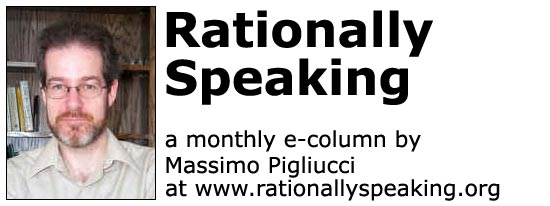|
|
|

N. 39, July 2003: Why Skeptic Doesn't Mean Cynic |
This column can be posted for free on any appropriate web site and reprinted in hard copy by permission.
If you are interested in receiving the html code or the text, please send an email
Massimo examines the difference between cynicism and skepticism, from dictionary defintions to common knowledge.
|
I am proud to consider myself a skeptic. I run a skeptic book club in town, and subscribe to magazines such as Skeptic and Skeptical Inquirer. I fantasize of being an intellectual descendant, in my small ways, of Scottish philosopher David Hume, who made “reasonable skepticism” his method of approaching problems ranging from the political to religious.
And yet, I constantly have to battle the prejudice (what else could it be?) that links skepticism with cynicism in the popular culture. Fellow skeptic Michael Shermer was once asked at a radio talk show to which we participated why he seemed such a jovial, easy-going fellow: after all, aren’t skeptics supposed to be constantly begrudging the very existence of the world?
Let’s start with the basics. The Oxford Dictionary defines cynisism as: “1. Tending not to believe in the integrity or sincerity of others. 2. Sceptical. 3. Contempuous; mocking. 4. Concerned only with one’s own interests.” Also according to the Oxford, the word probably derives from a Greek root naming a gymnasium in which the philosopher Antisthenes used to teach. Antisthenes was in fact the founder of the cynic school in ancient Greece, which was characterized by contempt for both pleasure and wealth.
Dictionary definitions, of course, are a mix of prescriptions for the “correct” usage of a term (we better try to use words consistently, or communication soon becomes impossible), and of descriptions of both current fashion and the past history of words. It is therefore interesting to note that while the Oxford lists skepticism as the second meaning of cynical, if one looks up skepticism itself the same dictionary tells a different story: “1. A person inclined to question or doubt accepted opinions. 2. A person who doubts the truth of Christianity and other religions; an atheist,” from the Greek for ‘inquiry, doubt.’
Well, if being skeptical means to doubt accepted opinions, given that the majority opinion is that there is some kind of God, I suppose a skeptic has to also be an agnostic (notice that “doubting” is not the same as “categorically negating”). More generally, though, skepticism seems to me to have a much more positive connotation than cynicism. While I would have admired Antisthenes’ contempt for wealth (I’m not so sure about pleasure), I would not make it a centerpiece of my philosophy. To doubt claims that are not backed by evidence, on the other hand, seems only reasonable. And to attempt to inquire into the soundness of such claims by seeking evidence in favor or against them ought to rate among the highest virtues of rational animals.
Instead, it is difficult to deny that skeptics are perceived at best as party poopers and at worst as permanent curmudgeons to be shunned at parties and ostracized in public discourse. Just consider the endless stream of TV shows on such exciting possibilities as extraterrestrial visits, chatting with the dead, or the healing power of prayer. In recent years, at least some of these programs have featured a skeptic (often the above mentioned Michel Shermer, or Paul Kurtz of the Committee for the Scientific Investigation of Claims of the Paranormal) to provide that most glorified myth of media coverage: “balance.” It turns out, however, perhaps not surprisingly, that the token skeptic attempting to explain the difficulties of conducting controlled experiments on prayer healing will be given a fraction of time, and that the program will always end with a leading question aimed at keeping the “mystery” alive and to prompt the viewer to tune in for next week’s installment.
Worse yet, skepticism is rarely practiced in the very earthly arena of public discourse, especially by media journalists whose job allegedly is to keep us informed and to keep everybody else (CEOs, politicians, ideologues) on their toes. The legendary Baltimore Sun skeptic at large of the first half of the 20th century, H.L. Mencken, may have been a bit too close to cynicism, but his reporting of the infamous “monkey trial” in Dayton, Tennessee in 1925 is still refreshing to read if you are not a zealous fundamentalist. Alas, investigative reporting à la the “Murphy Brown” TV series is rare and much needed, not because we live in especially troublesome times, but because we can always use people who ask good questions. (Some) politicians have always lied to the public to get their way, and so have (some) members of the military, some religious authorities, and occasionally even some scientists.
That is why Hume’s reasonable skepticism is vital to our society. It is not a question of not believing others as a matter of principle. Rather, it is about constantly exercising our critical thinking skills to make more informed decisions in our lives and when we go into the voting booth. In an age of weapons of mass destruction that vanish into thin air, victims of crime being blamed for the assaults they suffered, and outrageous claims concerning just about everything being thrown around as gospel on talk shows, it would come natural to be cynical. Instead, a little sane skepticism will do us much good.
Read or Add Comments about Rationally Speaking
|
Massimo’s other ramblings can be found at his Skeptic Web.
Massimo’s books:
Denying Evolution: Creationism, Scientism, and the Nature of Science

Tales of the Rational: Skeptical Essays About Nature and Science
|
|
|
Back to Rationally Speaking
|
![]()